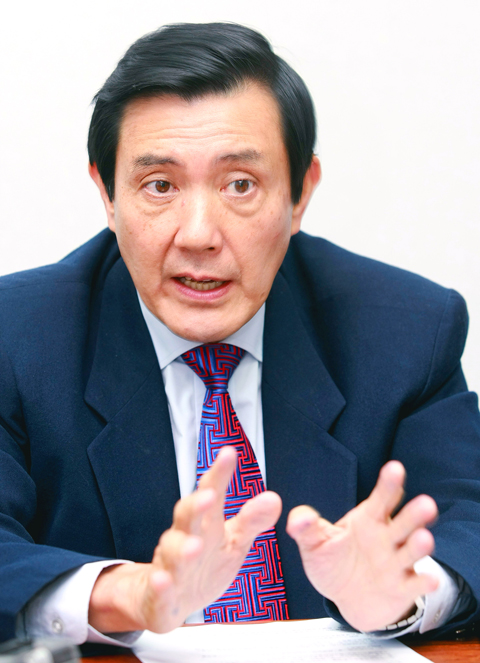President-elect Ma Ying-jeou (馬英九) said in an interview that he does not advocate “directly exporting democracy” to China, adding that by increasing cross-strait interaction, the merits of democracy would “naturally” lead to positive changes in China.
In an interview with the Central News Agency (CNA) on Friday, Ma said that the nation had in the past seen China as a threat and ignored the opportunities it presented.
Ma told CNA that increasing non-political exchanges across the Taiwan Strait would inevitably transfer democratic values to China, and that the results would benefit Taiwan’s national security.

PHOTO: CNA
This was a more effective way to increase security than simply increasing defense spending, he said.
Ma said the nation’s democracy was on display for the Chinese during the presidential election. After passionate campaigns by both candidates, the loser gracefully conceded defeat and the winner humbly accepted victory, he said, adding that this “had shaken China like nothing else could.”
In response to a CNA question about whether the nation should try to “export” democracy to China, Ma said this was not necessary, as the Internet and satellite television meant that many Chinese can see the merits of Taiwan’s democracy for themselves.
Ma cited a message posted on the Web site of China’s People’s Daily following city and county elections in Taiwan in 2005.
Ma said a reader posted the message, asking: “Why can the Taiwanese go to their neighborhood elementary school and cast ballots in an election, but we cannot?”
Ma said that his proposal that Taiwan recognize diplomas issued by Chinese universities would also help the nation exert its influence on China.
Recognizing Chinese degrees will lead to a greater number of Chinese students studying in Taiwan, he said.
“When these young people who receive their education in Taiwan return home, they will become some of Taiwan’s best friends,” he said.

‘DENIAL DEFENSE’: The US would increase its military presence with uncrewed ships, and submarines, while boosting defense in the Indo-Pacific, a Pete Hegseth memo said The US is reorienting its military strategy to focus primarily on deterring a potential Chinese invasion of Taiwan, a memo signed by US Secretary of Defense Pete Hegseth showed. The memo also called on Taiwan to increase its defense spending. The document, known as the “Interim National Defense Strategic Guidance,” was distributed this month and detailed the national defense plans of US President Donald Trump’s administration, an article in the Washington Post said on Saturday. It outlines how the US can prepare for a potential war with China and defend itself from threats in the “near abroad,” including Greenland and the Panama

A wild live dugong was found in Taiwan for the first time in 88 years, after it was accidentally caught by a fisher’s net on Tuesday in Yilan County’s Fenniaolin (粉鳥林). This is the first sighting of the species in Taiwan since 1937, having already been considered “extinct” in the country and considered as “vulnerable” by the International Union for Conservation of Nature. A fisher surnamed Chen (陳) went to Fenniaolin to collect the fish in his netting, but instead caught a 3m long, 500kg dugong. The fisher released the animal back into the wild, not realizing it was an endangered species at

The High Prosecutors’ Office yesterday withdrew an appeal against the acquittal of a former bank manager 22 years after his death, marking Taiwan’s first instance of prosecutors rendering posthumous justice to a wrongfully convicted defendant. Chu Ching-en (諸慶恩) — formerly a manager at the Taipei branch of BNP Paribas — was in 1999 accused by Weng Mao-chung (翁茂鍾), then-president of Chia Her Industrial Co, of forging a request for a fixed deposit of US$10 million by I-Hwa Industrial Co, a subsidiary of Chia Her, which was used as collateral. Chu was ruled not guilty in the first trial, but was found guilty

DEADLOCK: As the commission is unable to forum a quorum to review license renewal applications, the channel operators are not at fault and can air past their license date The National Communications Commission (NCC) yesterday said that the Public Television Service (PTS) and 36 other television and radio broadcasters could continue airing, despite the commission’s inability to meet a quorum to review their license renewal applications. The licenses of PTS and the other channels are set to expire between this month and June. The National Communications Commission Organization Act (國家通訊傳播委員會組織法) stipulates that the commission must meet the mandated quorum of four to hold a valid meeting. The seven-member commission currently has only three commissioners. “We have informed the channel operators of the progress we have made in reviewing their license renewal applications, and